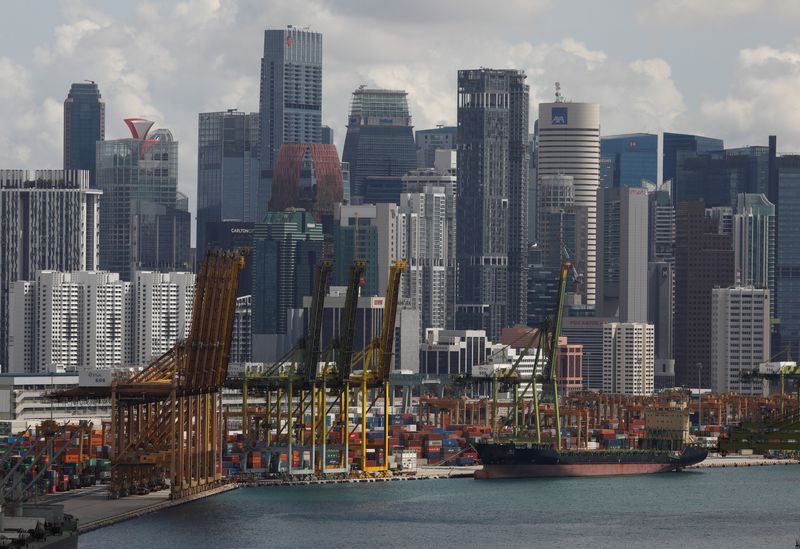By Xinghui Kok
SINGAPORE (Reuters) -Singapore's economy contracted in the first quarter, raising the risk of a recession in the city state as the global economic outlook weakens and major trading partner China struggles for a post-COVID lift-off.
Singapore, a major financial hub, is reliant on trade flow to keep its economy humming, though external demand has faltered in the wake of rising borrowing costs and still-strong inflationary pressures.
Gross domestic product rose 0.4% on a year-on-year basis in the first quarter of 2023, official data showed on Thursday, beating the advanced estimate of 0.1% released last month.
Yet, on a quarter-on-quarter, seasonally-adjusted basis, the economy shrank 0.4%, a reversal from the 0.1% growth in the fourth quarter of 2022 - leaving the affluent city state at risk of a technical recession in the event of another contraction in the current quarter.
Maybank economist Chua Hak Bin said a technical recession, defined as two consecutive quarters of contractions, is possible if the boost from China’s reopening fails to materialise in the second quarter.
"The return of China tourists is more a trickle than a flood so far," he said.
The trade ministry, however, said it does not expect a technical recession this year but acknowledged that the external demand outlook for the rest of the year had weakened.
Yong Yik Wei, chief economist at the trade ministry, said the government expects low quarterly growth in the first half of this year and a pick up in momentum thereafter.
"But obviously, you know, given the downside risks and the weakening outlook, we cannot rule out the possibility that there could be some quarters of negative q-on-q growth this year."
Separately, the central bank said its current monetary policy was appropriate but it is keeping a watching brief on both growth and inflation trends.
The Monetary Authority of Singapore left monetary policy levers unchanged last month, after tightening five times in a row from October 2021, including in two off-cycle moves last year in January and July.
The trade ministry is maintaining its GDP growth forecast at 0.5% to 2.5% this year, with growth likely to come in at around the mid-point of that range.

Maybank's Chua said he was surprised to see the growth forecast maintained.
"We are less optimistic and see the economy stagnating rather than rebounding in the coming quarters."